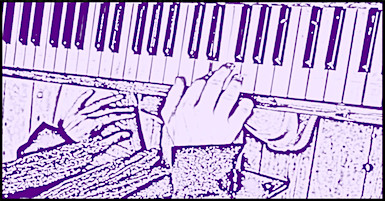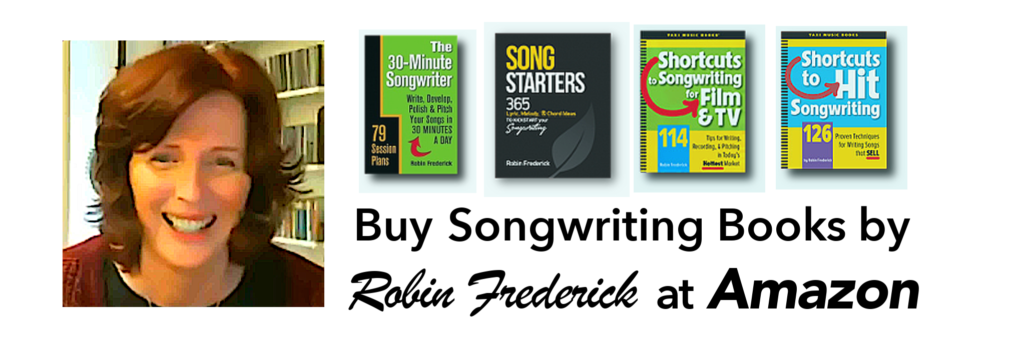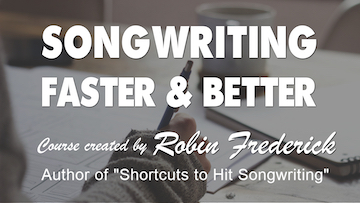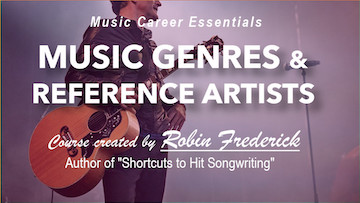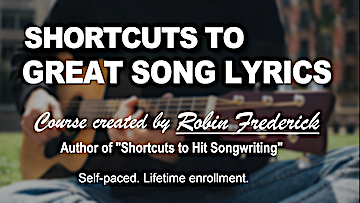
I’d Like to collaborate but I’m not sure how or whether it’s even a good idea. Can you help?
Lately I’ve been nudging songwriters toward more co-writing. Joining up with someone to combine your skills, resources, ideas, and energy will help you pick up your songwriting speed, finish more songs, find more opportunities and outlets, and so much more.
But my nudges are often meet with resistance. A lack of confidence or worry about looking foolish can really put the brakes on this idea. I call it collab-o-phobia: fear of co-writing. Here’s list of great tips that will banish it forever!
ARE SONG COLLABORATIONS IMPORTANT?

These days, co-writing is baked into a successful songwriting career. This week the top ten releases on all four mainstream music charts—Pop, Rock, Country, and R&B—are all collaborations. Even when I remove the track producers, I still see two to three co-writers.
On the Triple A chart, where you find Indie Folk, Americana, and non-mainstream singer-songwriters, the story is the same. Singer-songwriters like Maggie Rogers, Vance Joy, Donovan Woods, and Dermot Kennedy are all working with co-writers on their most successful songs.
NEVER SWEAT ANOTHER CO-WRITE!
Whether you’re co-writing online or in person, here are FIVE BIG TIPS that will help you ditch your collab-o-phobia and pull off your next session with confidence.
#1. THE MOST IMPORTANT THING: DON’T SHOW UP EMPTY HANDED.
If you’re expecting to drop into a session with co-writers you don’t know (or even ones you do know) and suddenly turn on your Creativity and dazzle everyone… you’re headed for trouble. The natural nerves and jitters you feel at the start of a session definitely do not lend themselves to brilliant flights of inspiration.
Instead, come to your session prepared with lyric or melody ideas that will get things started. Maybe play a catchy riff or a groove or loop. Or toss out a few titles or lyric hook ideas. Nothing gets other songwriters excited like a raw idea with potential.
To do this, you’ll need to spend some time preparing for your co-writing sessions. If you keep a notebook of lyric ideas, this is a good time to go through it. If you’ve recorded some verse or chorus scratch melodies, get a few of those recordings queued up and ready to play. You don’t need much, just a place to start from. (Be sure to add more ideas in between sessions.)
Remember, your co-writers might be feeling just as awkward and uninspired as you do! But if you play something that lights up an idea, the awkwardness will be gone in an instant.
ALSO IMPORTANT: Don’t polish the ideas you bring; let that happen in the session. And don’t come in already married to something exactly the way it is. If you feel that way about an idea, put it aside to work on yourself.
#2. GET TO KNOW YOUR CO-WRITER
If this is your first session together or you haven’t checked out your co-writer yet, try to get some insight into their musical strengths and skills.
What kinds of songs have they written in the past? Ask for links or look for them.
Does your collaborator write lyrics or melody or both?
Do they play an instrument? Sing? Can they create a chord progression, a groove?
How quickly do they write? Do they like to bang out a rough draft or take their time?
How often do they expect to work on the song you’re writing with them?
Do you have skills that they don’t?
These are questions that are worth talking about. You’ll not only learn about the songwriter you’re working with, but you’ll have a chance to tell them how you like to write. Co-writing can take many different forms. Find the one that works for you and your co-writer by discussing it early on.
#3. YES, YOU’LL HAVE A FEW STUPID IDEAS. THAT’S OKAY
There are TWO GOLDEN RULES OF CO-WRITING
- If you’re not tossing stuff out, you’re not taking enough risks.
- If you don’t take risks, you won’t find the gold.
You and your co-writer are going to be creative together. That means taking a chance on something you just thought of, a melody idea or lyric phrase that might not even be close to worked out. Collab-o-phobia can make you hold things back when co-writing, but you never know what will spark an idea for your writing partner. So go ahead and blurt it out. A good co-writer will respect the risk you’re taking and try to build on the idea.
WHICH BRINGS ME TO THE THIRD GOLDEN RULE…
- If a collaborator doesn’t treat your ideas with respect, find another collaborator.
Co-writers don’t have to agree on everything (and they won’t), but they do have to acknowledge and express genuine interest in each other’s ideas.
#4. LEAVE ROOM FOR THE UNEXPECTED
Collaboration works best when there’s an element of play. Brute force can get you through a mediocre song, but coming up with the perfect inspired lyric idea or the right unexpected melody twist depends on a sense of freedom, risk taking, and, yes, playfulness.

So instead of hammering your heads against a brick wall, when you and your co-writer can’t think of anything, try playing a few word games to loosen up. These games are a lot like the warm-up exercises actors do before an improvisation. (Collaboration is a lot like improvising.) You can start a collaboration session with a game or use one to shake loose a few ideas when you’re stuck. They’re silly, quirky, dumb, and they free up your creativity in minutes.
-> One person says a word and another uses it in an outlandish or impossible statement.
-> Choose a hit song lyric and write parody lyrics for the chorus.
-> Take turns coming up with a line the other person must write a rhyming line for.
-> Write the worst verse or chorus you can think of.
-> Starting each line with “Yes, and…,” throw lines at each other as fast as you think of them.
-> Choose any word and start a string of associations. Go back and forth adding a word associated with the previous word each time. (“cat” “fur” / “fur” “coat” / “coat” “winter,” etc.)
#5. USE REFERENCE SONGS

There’s nothing more frustrating than trying to describe something you hear in your head to someone who isn’t hearing it! This is where reference songs can be enormously useful in a collaboration.
Ask your co-writer what kind of song they’d like to write. See if you can get them to name one or two songs in that style, and then listen to them together. Discuss what you hear and what you think you can do in that style. Of course, you can also show your collaborator a couple songs you’d like to aim for.
Is there a specific project or pitch the two of you are interested in? Were any reference songs given? Listen to the songs together and talk about what you could do that is similar.
- What kind of language is used in the lyric?
- What sort of grooves are used?
- How does the melody handle rhythm and repetition?
- How will you keep the production affordable?
If you’re aiming for a specific song market—artist pitches in the Pop radio market of Film & TV songs—listen to some successful songs in that market together and use the list of questions above to talk about what you think makes them work and what you could do with that.
Find out more about playlists in this post. SONG PLAYLISTS: A Film & TV Songwriter’s Secret Weapon!
Co-writes you didn’t know were co-writes
“BRAVE” – SARA BAREILLES (with Jack Antonoff)
“DRIVER’S LICENSE” – OLIVIA RODRIGO (with Daniel Nigro)
“HELLO” – ADELE (with Greg Kurstin)
“HOLD BACK THE RIVER” – JAMES BAY (with Iain Archer)
“SOMEONE YOU LOVED” – LEWIS CAPALDI (with Samuel Romans & TMS)
Read my Hit Song Guides to Driver’s License and Hello on my blog.
What to look for in a co-writer
Here’s a short but useful list…
~ Dependability
~ Respect for your ideas and opinions
~ Shared taste in song styles and artists
~ Songwriting experience equivalent to or greater than yours.
~ Willingness to talk frankly about songwriting and business arrangements.
Try It Now
If you’re ready to look for a co-writer to work with, here’s a post on my website with a list of 5 places to look for co-writers. If you already know a songwriter you could work with… what are you waiting for? Now you know how to do it!
